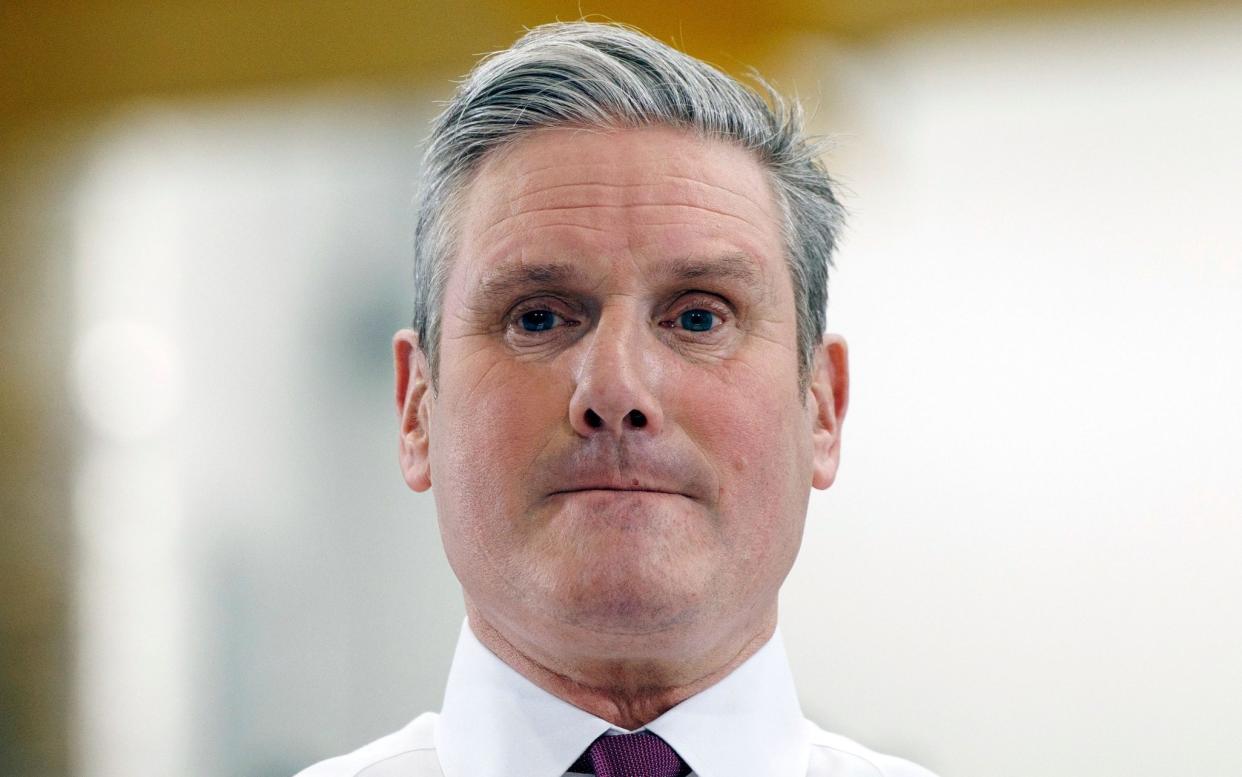Business leaders should be careful what they wish for in cheering on a Labour victory

- Oops!Something went wrong.Please try again later.
- Oops!Something went wrong.Please try again later.
- Oops!Something went wrong.Please try again later.
It reads like a roll call of the City’s great and the good: Elizabeth Corley, chair of Schroders; Douglas Flint, chairman of Abrdn; Nigel Higgins, a one time Rothschild lifer and now chairman of Barclays; John Kingman, chairman of Legal & General; Shriti Vadera, chair of Prudential; David Schwimmer, chief executive of London Stock Exchange Group, and so on.
Yet this is not a list of those dashing to support the ruling Tory Party in its hour of need, as once might have been expected of the leading lights of high finance. No, they are in fact part of a panel of City grandees advising Labour on future policy priorities for the financial services industry as the Opposition prepares for power.
OK, so one of them, Shriti Vadera, was a member of the last Labour government, so there can be little question about where her loyalties lie. Still others saw their formative years under Blair’s New Labour, so are bound to be less apprehensive about Labour’s resurgence in the polls than might have been the case among past generations of City practitioners.
At this stage, a Labour victory seems virtually inevitable, so you’d also expect business lobbies to be cosying up to the likely winners in the hope of dissuading them from doing stupid things.
All the same, not since the dying days of John Major’s government has the sense of business and City luminaries deserting the Tory Party for the unknown quantity of Labour been as palpable as it is now. The City ought to be a natural supporter of the centre-Right, but there is no such certainty today.
For business leaders, stability, predictability and competence in public policy is valued above almost anything else. That they should think Labour is more likely to deliver these qualities than the presiding government is a shocking indictment of the chaos and ineptitude of the last eight years.
By continually changing his position, Keir Starmer, the Labour leader, attempts to be all things to all men. He’s ever harder to pin down, making it ever harder to know what he would actually do if elected.
I’m not sure he knows himself. He’s been relatively effective in vanquishing Labour’s toxic, Corbynista past, but poor at articulating a credible alternative.
What passes for a policy agenda is in truth little more than a list of aspirations that are so anodyne and obviously desirable that no-one is going to take serious issue with them. He might just as well have promised to cure the world of all known diseases.
Under Labour, Britain is apparently going to become the fastest-growing economy in the G7, but as to how, answer comes there none. Similarly with getting the NHS back on its feet and breaking down the barriers to opportunity.

Making Labour electable has caused Starmer to continually row back on previous positions and pledges, such that he is now a completely blank canvas. You always knew where Blair was coming from in taking his party to the Right. That’s not true of Starmer.
Perhaps oddly, this doesn’t seem to matter to many industry leaders. To them his attraction is simply that he is not the Tories.
“Put it like this,” one tells me. “Let’s suppose that by some miracle the Government scrapes home. What would we then have in prospect? Another five years of nativist versus globalist Tory civil war and flip flopping government paralysis. No thanks.”
Once a pragmatic, pro-business party of the centre-Right, the Conservatives have become victims of their own activists, a fate not dissimilar to what happened to Labour after it lost power in 2010.
To be clear, no-one I talk to in the City and business backs Labour with any great enthusiasm. For them it is merely a question of the lesser of two evils.
Even fewer have any confidence that Labour is capable of effectively addressing any of the overarching challenges facing the UK economy and body politic. Like voters as a whole, it’s merely a case of deep-seated disillusionment with the incumbents.
Nevertheless, business people should be careful what they wish for. We may not know much about Labour’s plans, but there are two things we can be reasonably certain of.
One is that the tax burden, already at a post-war high of nearly 40pc of GDP, will rise even further under a Labour government, possibly to as high as the sort of level that rules in Germany.
It has long been the curse of British democracy that voters expect both Northern European standards of public services and welfare, but American levels of taxation. Neither of the two main political parties are prepared to stand up and admit that this cannot sustainably be delivered.
Unfortunately, the forces driving taxation higher are rather bigger than those of small state ideology – the growing costs of an ageing society, the disappearance of the post-Cold War peace dividend, and the inability of any government to get to grips with the leviathan of the NHS.
Even so, we can be pretty confident that whatever Labour says to the contrary, the party will be a good deal less effective at controlling public spending than the Tories. A penny to a pound, we’ll end up with European levels of tax but American standards of public services and welfare, or the worst of both worlds. Labour’s ludicrously named “Office for Value for Money” is most unlikely to protect us from such a fate.
Labour has so far cited three potential sources of extra taxation: non-doms, private equity and VAT on private school fees.
Politically these are reasonably well-judged targets, in that there is little public sympathy for any of them. The millions of pounds that wealthy hedgies and private equiteers might pour into the Conservative Party’s electoral coffers won’t save them from Labour.
But potentially driving high earners away by taxing them more heavily is also likely to be growth-destructive. Nor in the round will it raise much money. To make a significant impact to revenues, the tax net will have to be cast much wider. One way or another, we are all going to end up paying more tax.
The other thing we can be certain of with Labour is a significant tightening up of employment rights, including a so-called “new deal for working people” that would crack down on zero hours contracts and reverse much of the trade union reform of recent years.
Britain’s flexible labour market is one of the things the UK economy has got going for it, yet under Labour it is to be heavily curtailed. Making it easy to hire and fire is a prerequisite of any high growth, enterprise economy. Make it more difficult and you create a form of employment apartheid – those with jobs and those without – and thereby impair the pace of change.
Business lobbies can be forgiven for having had enough of the Tories. But don’t expect the alternatives to be any better.

